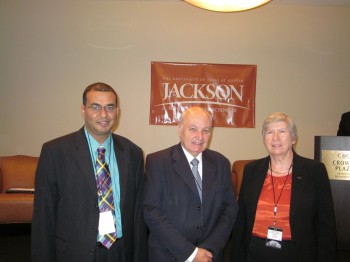Southern Potential: Government and Industry Leaders Seek Common Ground on Sustainable Oil and Gas Development for the Americas
January 7, 2013

In one of the most high-octane meetings since its launch in 2005, the Jackson School’s Latin American Forum on Energy and the Environment drew leaders from nine countries and representatives from across the Americas to Houston last March for a conference dominated by the impact of rising unconventional reserves in the southern hemisphere.
Recent estimates of reserves in Argentina have positioned that country as potentially the next Latin American energy leader. National energy policies across the southern cone, however, remain a question mark for economic development, as several presenters discussed.
Headliners at the seventh forum (the first staged in Houston) included Ambassador Carlos Pascual from the U.S. Department of State, Juan Legisa from Argentina’s Department of Energy, and the Honorable Robert Persuad from Guyana’s Ministry of Natural Resources and the Environment.
Pascual offered a government perspective on the Summit of the Americas in Cartagena, but he drew the most attention discussing transparency rules that the Securities and Exchange Commission proposed for U.S. energy companies working overseas. According to the rules (proposed at the time and adopted after the forum), all companies listed on the New York Stock Exchange are required to disclose payments to foreign governments for activities related to the exploration and development of oil and natural gas.
U.S. energy companies have complained that the provisions would be costly and would require them to reveal confidential contractual information. Pascual believes that if key European stock exchanges adopted the same rules, they would cover more than 70 percent of all energy companies worldwide.
“Once you start getting that coverage and that kind of comparability in performance, you begin to reduce the space that individual companies can have to violate the rules and operate differently in the energy sector and potentially bring in other kinds of payments and investments and factors that might distort the market,” Pascual said.
Unconventional Possibilities

No matter what their nationality, speakers found their most common theme was the impact of expanding reserves of unconventional oil and gas.
Legisa offered a snapshot of Argentina’s massive potential in unconventionals including shale gas, tight gas sands, coal-bed methane, and shale oil. According to the 2011 Annual Energy Outlook from the U.S. Energy Information Administration (EIA), Argentina has the world’s third highest geological potential for unconventional hydrocarbons, after China and the U.S. In just one area, shale gas, the EIA study estimated Argentina’s reserves at 774 trillion cubic feet (TCF), 60 times greater than the country’s current conventional reserves.
The presence of vast, untapped reserves like Argentina’s led one presenter, Ramon Hernán of Spanish energy giant Repsol, to predict that only gas and renewables will increase their net share of the Latin American energy consumption matrix in the coming decades, with gas consumption increasing by 50 percent. Hernán listed his reasons for forecasting such a dramatic increase for gas: availability, energy security, environmental benefits, slowed growth of nuclear energy, storage issues with renewables, flexibility, and potential use for transportation, particularly in the form of LNG.
Presenters from international oil companies working in Argentina addressed one of their top-of-mind business questions: What will it take to unleash greater international investment in Argentina’s energy sector? The answer may seem obvious: higher prices that will allow them to make a profit. But to date, the administration of Argentine President Cristina Fernández de Kirchner has pursued steps to tamp down energy prices. The effect has been to make oil companies wary of investing in a country where low prices curb profitability. Partly as a result, Argentina over the past several years has moved from being an energy exporter to importing fuel from countries as far away as Qatar.
Just a few weeks after the Latin American Forum, Kirchner sent another chill through international markets by expropriating a controlling stake in YPF, the company that Repsol acquired in 1999, and that was previously Argentina’s national oil company. With the expropriation this summer, Argentina now owns 51percent of YPF.
In contrast to Argentina, Columbia has carefully planned market policies that could position it to become the next boom area, explained RoseAnne Franco of Wood Mackenzie. Columbia’s pro-expansion policies distinguish the country during a nascent period of resource nationalism.
“Periods of resource nationalism tend to be preceded by periods of rising resource prices,” such as the 1970s and 2000s, explained Franco. She foresees Latin American countries now moving toward a new stage of “resource maximization.” After a period of reasserting national control over resources, countries experience stabilized or dropping prices and subsequently want to maximize value from their resources. Franco forecasts this process in Latin America will lead to greater reaching out to international energy companies.
Avoiding the Curse

While Argentina grapples with the impact of globally significant gas reserves, Guyana faces the prospect of developing recent discoveries expected to transform this small nation of less than 800,000 residents.
Reserves have long been known to exist offshore from Guyana but maritime border disputes with Brazil and Surinam kept exploration in check until just a few years ago. Today, ten oil companies are active or poised to jump in to the Guyana Suriname basin, which has a proven hydrocarbon system and highly prospective deep water plays that can be drilled in shallow water.
The United States Geological Survey (USGS) has identified the basin as having the second highest resource potential among unexplored oil basins in the world. USGS estimates mean recoverable oil reserves over 15 billion barrels and gas reserves of 42 trillion cubic feet.
For a country with an annual per capita GDP of less than $5,000, these are significant numbers.
According to Energy Minister Persuad, Guyana is determined to avoid the infamous “resource curse” that has plagued so many underdeveloped nations that discover oil and gas reserves. To that end, Persuad and President Donald Ramotar are committed to engaging the Extractive Industry Transparency Initiative, the 36 nation group that aims to reduce corruption and help spread the wealth in poor countries with rich mineral deposits.
In addition to seeking transparent business practices, Guyana must balance environmental considerations. Offshore tourism is one of the country’s most successful business sectors. And Norway committed to a plan to transfer as much as $250 million to Guyana over five years in exchange for reforestation projects that maintain or expand jungle preserves.
“We want to be that role model, in terms of pursuing hydrocarbon resources but doing it in a sustainable way,” said Persuad, who came to the forum in part to seek advice and counsel.
Guyana in particular needs academic and research expertise, which The University of Texas at Austin could supply.
“I can count on my hands the people in Guyana with experience in the energy sector,” said Persuad.
Persuad’s presence in Houston epitomized the originally intended value of the Latin American Forum, designed in 2005 to bring together academic, corporate, government, and non-government stakeholders in energy and the environment, creating a space where they could meet regularly and pursue common, balanced solutions to hemispheric needs.
by J.B. Bird
